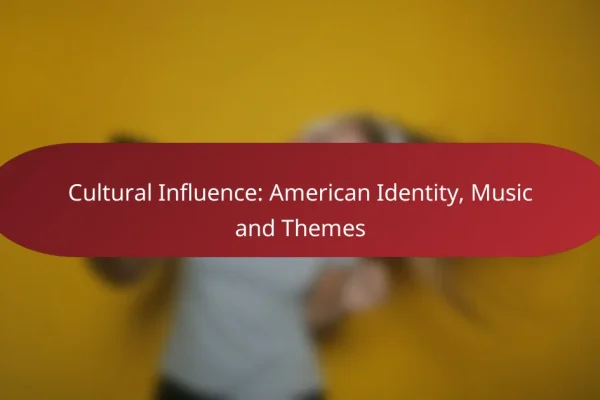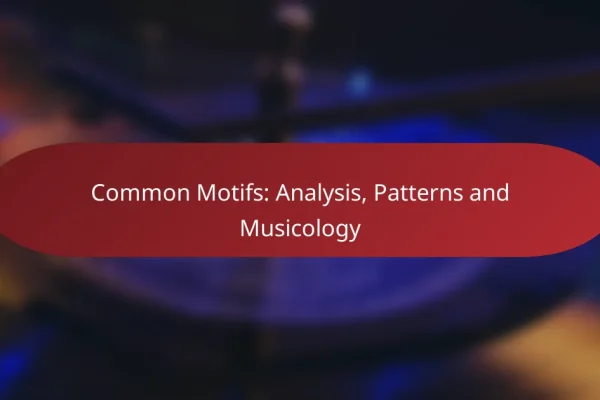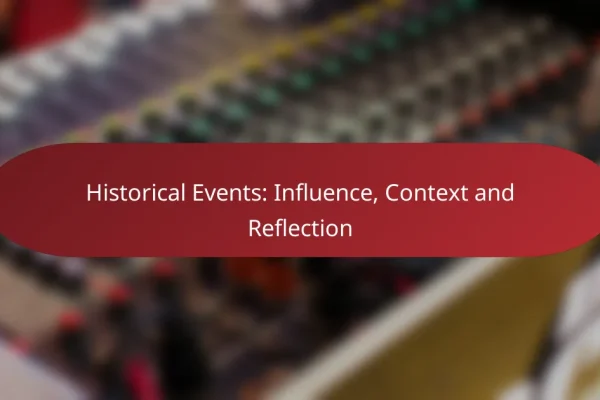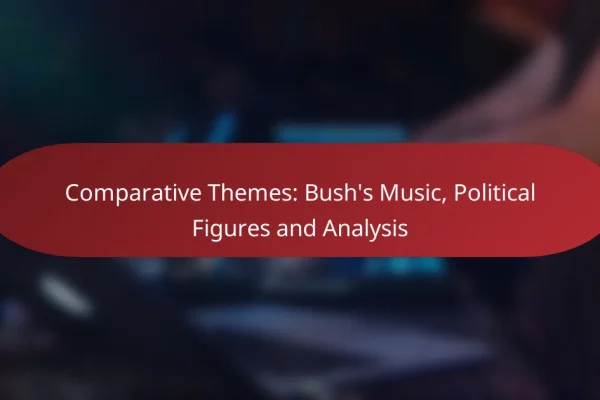What themes are prevalent in George W. Bush’s music?
George W. Bush’s music often reflects themes of patriotism, personal reflection, and unity and healing. These elements resonate with his experiences and the historical context of his presidency, offering listeners insight into his values and sentiments.
Patriotism
Patriotism is a central theme in George W. Bush’s music, often expressing love for the United States and its ideals. His songs frequently evoke national pride and honor the sacrifices made by service members, reflecting a deep connection to American identity.
For example, lyrics may reference iconic American symbols or historical events, reinforcing a sense of belonging and duty. This theme resonates particularly during times of national crisis, where music serves as a rallying cry for unity and resilience.
Personal Reflection
Personal reflection in Bush’s music allows him to share his thoughts and emotions, often revealing vulnerabilities and introspection. This theme provides a glimpse into his personal journey, including his challenges and triumphs during his presidency.
Through storytelling in his lyrics, he connects with listeners on a human level, inviting them to consider their own experiences. This reflective quality can foster a sense of empathy and understanding among diverse audiences.
Unity and Healing
Unity and healing are prominent themes in Bush’s music, particularly in the aftermath of national tragedies. His songs often emphasize the importance of coming together as a nation to overcome adversity and support one another.
By promoting messages of hope and reconciliation, Bush’s music aims to inspire collective strength and resilience. This theme is especially poignant during times of division, encouraging listeners to focus on shared values and common goals for a better future.
How does George W. Bush’s music reflect American values?
George W. Bush’s music often embodies core American values, emphasizing themes like freedom and diversity. Through his musical choices and lyrics, he communicates a sense of patriotism and inclusiveness that resonates with many Americans.
Emphasis on Freedom
The theme of freedom is prevalent in George W. Bush’s music, reflecting the American spirit of independence and self-determination. Songs that celebrate personal liberties and the right to pursue happiness resonate strongly with listeners, reinforcing the belief in individual rights.
For example, tracks that highlight the struggles for freedom, such as those referencing historical events like the Civil Rights Movement, serve to remind audiences of the ongoing journey toward liberty. This connection to freedom is a powerful motivator in American culture, often inspiring unity and pride.
Celebration of Diversity
Bush’s music also showcases a celebration of diversity, highlighting the rich tapestry of cultures that make up the United States. By incorporating various musical styles and influences, his work reflects the nation’s multicultural identity and promotes inclusivity.
For instance, songs that feature different genres, such as country, rock, and folk, illustrate the blending of traditions and perspectives. This celebration of diversity encourages listeners to appreciate the variety of experiences that contribute to the American narrative, fostering a sense of community and understanding among different groups.
What are the key songs that illustrate these themes?
Key songs that illustrate the themes in George W. Bush’s music include patriotic anthems that evoke national pride and unity. These songs often reflect the sentiments of American resilience and hope during challenging times.
“The Star-Spangled Banner”
As the national anthem, “The Star-Spangled Banner” embodies American patriotism and resilience. Its lyrics celebrate the defense of the nation during conflict, making it a powerful symbol of national identity.
This song is often performed at public events, reinforcing a sense of unity among citizens. Its emotional weight can evoke feelings of pride and solidarity, especially during moments of national significance.
“God Bless the USA”
<p“God Bless the USA” is a contemporary patriotic song that resonates deeply with American audiences. Written by Lee Greenwood, it expresses gratitude for the freedoms and opportunities available in the United States.
The song is frequently played at national holidays and events honoring military service, reinforcing themes of sacrifice and appreciation. Its catchy chorus and heartfelt message make it a staple in American culture.
“America the Beautiful”
“America the Beautiful” is another iconic song that highlights the beauty and grandeur of the American landscape. Its lyrics evoke a sense of pride in the country’s natural wonders and the ideals of liberty and justice.
This song is often used in various ceremonies and celebrations, serving as a reminder of the values that unite Americans. Its melodic and lyrical beauty makes it a beloved choice for expressing national pride.
How has George W. Bush’s music evolved over time?
George W. Bush’s music has transitioned from a focus on political themes to more personal and introspective topics. Over the years, his style has incorporated various contemporary influences, reflecting changes in both his life and the broader musical landscape.
Shift from Political to Personal
Initially, George W. Bush’s music was heavily influenced by his political career, often addressing themes of patriotism and national unity. As he moved away from the presidency, his songwriting began to explore more personal narratives, touching on family, relationships, and personal growth.
This shift allows listeners to connect with Bush on a more intimate level, as he shares experiences that resonate beyond the political sphere. Songs now often reflect his journey and the lessons learned throughout his life, making his music relatable to a wider audience.
Incorporation of Contemporary Styles
As George W. Bush’s music evolved, he began to blend contemporary styles such as country, rock, and folk into his compositions. This incorporation not only modernizes his sound but also attracts a diverse range of listeners who appreciate these genres.
For example, elements of Americana and acoustic instrumentation can be found in his recent works, creating a more accessible and engaging listening experience. This evolution demonstrates his willingness to adapt and experiment, ensuring his music remains relevant in today’s musical landscape.
What role does music play in political campaigns?
Music serves as a powerful tool in political campaigns by creating emotional resonance and enhancing messaging. It helps candidates connect with voters on a personal level, reinforcing their brand and values through carefully selected songs.
Emotional Connection with Voters
Music can evoke strong emotions, making it an effective means for candidates to establish a bond with their audience. Campaigns often use anthems that reflect their core messages or resonate with the values of their target demographic.
For example, upbeat and patriotic songs can inspire feelings of hope and unity, while somber tunes may underscore serious issues. Candidates should choose music that aligns with their campaign’s tone and the sentiments of their constituents.
Messaging and Branding
In political campaigns, music plays a crucial role in shaping a candidate’s brand identity. The right song can encapsulate a candidate’s message, making it memorable and easily recognizable to voters.
For instance, using a specific track consistently at rallies and events can create a sense of familiarity and loyalty among supporters. Candidates should ensure that the music they select not only reflects their values but also resonates with the cultural context of their audience.
How do themes in Bush’s music compare to other political figures?
Themes in George W. Bush’s music often reflect a blend of patriotism and personal experience, which can be compared to the musical expressions of other political figures. While Bush’s music emphasizes resilience and unity, other leaders like Barack Obama incorporate themes of hope and change, showcasing different emotional landscapes in their musical choices.
Similarities with Barack Obama’s music
Both George W. Bush and Barack Obama utilize music as a means to connect with their audiences on an emotional level. Bush’s songs often highlight themes of American strength and perseverance, while Obama’s music tends to focus on themes of hope and collective progress.
For instance, both leaders have included songs in their playlists that resonate with national pride. Bush might lean towards country and rock genres that evoke a sense of Americana, whereas Obama often favors R&B and hip-hop, reflecting a broader cultural spectrum.
Ultimately, both Bush and Obama use music to reinforce their political messages, albeit through different stylistic choices that reflect their unique identities and the eras they represent.












